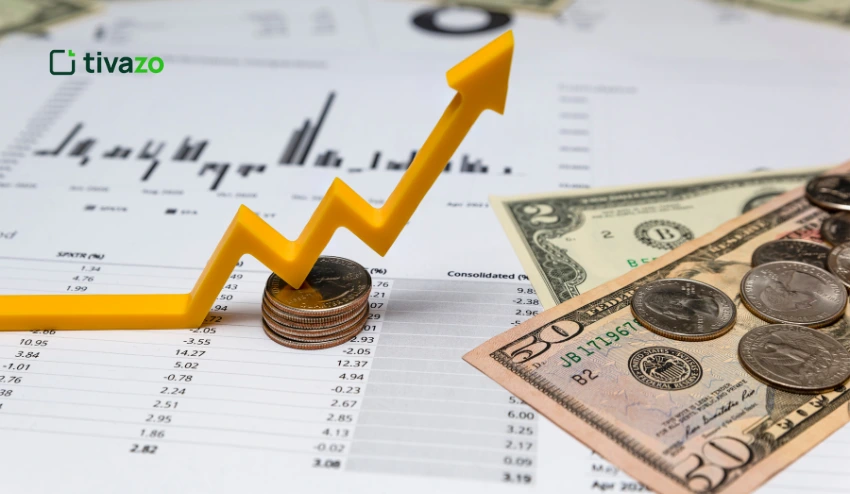The shiny skyline and thriving tech industry, along with the K-pop dominance, portray the image of a high-income, high-paced economy, but what do the average workers in South Korea earn? Are you thinking about relocating, bargaining a wage, or tracking the world labor patterns? If yes, knowing the average salary in South Korea is not only about figures, it is about living, potential, and economic truth.
By 2025, the wage environment in South Korea will be a multifaceted combination of innovation, competitiveness, and increasing social inequality. Wages are astronomical in the tech industry and meager in the manufacturing industry, with a huge difference between the highest and the lowest incomes among cities. And an average income can seem pinched in major cities such as Seoul, as the cost of living continues to increase.
In this guide, we will know the earnings of the South Koreans, why it is important to the rest of the world, and what the numbers mean to the employees, employers, as well as the job market in general.
Key Highlights:
- Average Monthly and Annual Salary in South Korea
- Minimum Wage in South Korea
- Cost of Living in South Korea Compared to Salaries
- Salary Comparison by Industry in South Korea
- Salary Differences Based on Education
- How Tivazo Helps Employers Calculate The Fair Salary Of An Employee?
Annual Salary And Monthly Average Salary In South Korea
According to Early App, Time Champ, and Time Doctor, as of 2025, the monthly average salary in South Korea is 3,815,000 to 3,900,000 KRW (approximately 2,687 to 2,846 USD). This implies that the mean salary per year ranges between 45,780,000 and 53,898,000 KRW ($32,241 to 39,332 USD).
But averages are deceptive. The median wage, which is more representative of what the majority of the population earns, is 3,500,000 KRW per month or approximately 42,000,000 per year. This indicates that approximately 50 percent of the South Korean workers earn less than that figure.
Cost of Living Compared to Average Salary In South Korea
The meaning of income needs a context. The cost of living in South Korea is a key factor that determines the extent of your salary.
It may take a single individual between 2,500,000 to 3,000,000 Korean won per month to live in Seoul, the capital city and the most costly city in the country. When compared to the average salary in South Korea, this amount can significantly strain one’s finances. For example, renting a one-bedroom apartment in the city center can easily cost 1,200,000 won, and frequent dining out can add up quickly.

In smaller cities such as Daegu or Gwangju, the expenses are cheaper, and it is easier to save with the same income. Therefore, although salaries are a little better in Seoul, the cost of living usually offsets the income difference.
Briefly, 4 million in Seoul can be like 3 million in other regions.
Salary Comparison by Industry in South Korea
The industry that a person works in is one of the most influential factors that influence the average salary in South Korea. The pay scales in various sectors are extremely different based on the skills, demand, and the general value of the sector to the economy. Salary differences may be high, in highly technical jobs as well as in service-based jobs.
Although South Korea is still consolidating its position in the world market in such areas as technology, finance, and healthcare, other sectors, including manufacturing and education, are not as successful. The table below shows how the average salary in South Korea will be distributed in major industries in 2025:
1. Healthcare and Medical
Healthcare still provides the best average salary in South Korea across all industries. The demand for advanced medical care by the aging population has created a strong market of skilled professionals. Although medical professions necessitate a lot of education and licensing, they tend to be financially stable in the long run.
The compensation in this industry is broad, competitive, and ranges from hospital-based specialists to the frontline nurses. The multifaceted nature of healthcare jobs directly corresponds to the high pay scale that professionals can enjoy.
- Surgeons earn between ₩8,280,000 and ₩26,400,000 per month, depending on specialization and hospital.
- Dentists average ₩9,370,000 per month.
- Nurses earn between ₩3,500,000 and ₩4,500,000 monthly.
These numbers reflect both the long educational path and the high demand for medical services.
2. Information Technology (IT)
The average salary in South Korea, particularly in the IT industry, has been affected significantly by the tech boom. Being one of the countries that is most digitally developed, companies are keen to hire talented developers, engineers, and cybersecurity experts.
High salaries, rapid career advancement, and bonuses make this industry one of the best options for young specialists and international talent. In South Korea, IT professionals are usually paid above average, even at entry-level jobs.
- Software developers earn an average of ₩3,950,000 per month.
- Cybersecurity analysts and product managers earn closer to ₩5,500,000–₩6,100,000 monthly.
This field also offers strong performance-based bonuses and faster salary growth.
3. Education
The earnings of teaching jobs vary widely across institutions. Although ESL or public school teachers at lower levels are paid below the average salary in South Korea, the education industry remains a significant contributor to the future growth of the career. South Korea has a relatively high average salary for university lecturers.
Education is still a prestigious occupation in Korea, and, as time progresses, teachers with special degrees or other advanced education teaching qualifications will find the pay and benefits to be more favorable.
- Public school teachers (EPIK) earn between ₩2,100,000 and ₩2,700,000 monthly.
- University professors and lecturers earn around ₩4,500,000 to ₩6,500,000 per month.
4. Banking and Finance
The average salary in South Korea is always below that of financial professionals, particularly when their work is related to investment strategy, corporate finance, or leadership. The competitive remuneration of qualified professionals is contributed to by the presence of South Korea in the global banking industry.
The financial sector is rewarding to both entry-level analysts and C-suite executives with results and certifications like a CPA or CFA. This sector also has more bonuses and stock options than others.
- Investment bankers, accountants, and risk analysts earn between ₩4,000,000 and ₩6,000,000/month.
- CFOs and high-level executives often earn above ₩8,500,000/month.
5. Manufacturing and Construction
Even though manufacturing and construction are the pillars of the country’s economy, they are likely to be lower than the average salary in South Korea. Nevertheless, these industries continue to provide employment and opportunities for skilled workers and technicians.
Well-established employees who work in a supervisory or engineering position are able to achieve good income too, particularly in such industries as shipbuilding or heavy industry, where specialized skills are required.
- Factory workers and technicians earn around ₩2,400,000 to ₩2,700,000/month.
- Supervisors and engineers with experience can make up to ₩4,000,000/month.
Salary Differences Based on Education
Education plays a huge role in salary potential in South Korea, especially in fields like IT, engineering, and medicine. According to data from Time Doctor and Time Champ, here’s how educational level influences pay:
- High School: baseline income
- Diploma: +17%
- Bachelor’s degree: +24%
- Master’s degree: +29%
- PhD: +23% (compared to master’s)
While the initial investment in higher education is high, the long-term salary boost often justifies it, particularly in competitive sectors.
Salary Growth by Experience Level
Years of experience continue to influence wages, although the impact lessens as one progresses in their career. According to Time Doctor:
- 2 to 5 years of experience yields a 32% increase over entry-level pay.
- 5 to 10 years brings a 36% increase.
- 10 to 15 years offers an additional 21%.
- After 15 years, growth slows to around 14%.
This is largely due to South Korea’s traditional seniority-based pay system, where salaries increase with tenure rather than performance, though newer companies are now shifting toward merit-based structures.
Regional Differences in Salaries
Wages vary significantly by city, reflecting local cost of living, industry concentration, and job availability.

Here’s a look at the average annual salary by city:
- Seoul: ₩52,320,000
- Busan: ₩51,480,000
- Incheon: ₩50,520,000
- Daegu: ₩49,560,000
- Daejeon: ₩48,730,000
- Gwangju: ₩47,900,000
While Seoul pays the most, it also has the highest housing and transport costs. Mid-sized cities offer better affordability with slightly lower salaries.
Minimum Wage in South Korea (2025)
Minimum wage in South Korea in 2025 will be 10,030 won per hour, or roughly 2,096,270 won per month, assuming a full-time worker doing 40 hours of work each week. It is a slight improvement over the past years, as the government attempts to raise the compensation of workers and narrow the income gap. Nevertheless, even with this trend, this wage rate is not enough to cover the cost of living in South Korea, particularly in high-cost cities such as Seoul and Busan.
Basic necessities like rent, transport, and groceries take up a significant percentage of the income of workers on the minimum wage, leaving them with little to save and invest. Others have to survive on part-time employment, family, or government handouts. Compared to the average salary in South Korea, the minimum wage still falls short. The minimum wage is essential in ensuring that the level of employment is up to standard, but it is not the living wage that many people would regard as. The debate about wage reform and income inequality has remained a burning topic of national concern.
Gender Pay Gap and Wage Inequality
Although South Korea has made a lot of advancements in education and technology, the country is struggling with a broad gap in gender pay gap. The OECD said women in South Korea receive about 30 percent less than men for the same jobs, even though the average salary in South Korea has generally increased over time.
The disparity is particularly acute in leadership, tech, and finance. The disparity is caused by cultural expectations, fewer maternity provisions, and lower rates of promotion of women.
The government is already working on implementing equal pay, but to make a significant difference will probably take time.
Outsourcing and Expat Salaries
South Korea is now one of the popular outsourcing options in technology, engineering, and design. Korean developers, designers, and customer support representatives are commonly employed by international firms at mid-level world prices that are cost-effective and high-quality, often aligning with or slightly below the average salary in South Korea for similar roles.
Teaching is also a common occupation amongst expats, particularly native English speakers, with salaries between 2,100,000 and 3,500,000/month depending on experience, location, and the type of school.
Professional experts (IT, finance, legal) are likely to earn 4,000,000 to 6,500,000/month or more, particularly when they are hired abroad.
But it can be mentioned that the relocation packages, which contained housing, flights, and bonuses, are not as frequent in 2025 as they were ten years ago.
The Missing Piece: Salary Satisfaction in South Korea
One crucial insight often left out of salary comparisons is how satisfied people are with what they earn.
A 2024 Gallup Korea poll found that only 42% of South Koreans feel their salary reflects their contributions. Among younger workers, particularly those in their 20s and 30s, the number drops to 31%.
Reasons for dissatisfaction include:
- Long working hours (often exceeding the legal 52-hour cap)
- Poor work-life balance
- Limited salary negotiation power
- Stagnant wages after age 40
This disconnect between the average salary in South Korea and job satisfaction highlights an emerging shift: more workers now prioritize remote flexibility, growth opportunities, and mental health over raw pay alone.
How Tivazo Helps Employers Calculate The Fair Salary Of An Employee?
Tivazo is making it easy to calculate a fair salary by integrating accurate time tracking, team analytics, and productivity insights, all of which are crucial in calculating truly equitable pay. Employers will be able to gauge the output of an employee by keeping track of the working hours and activities. This open worker pay information is useful in making more objective payment choices, which match compensation and actual performance, as well as criteria such as the average South Korean salary.

Also, Tivazo provides powerful earning insights by allowing the creation of customizable reports that emphasize overtime, attendance patterns, and project-based effort. Employers apply these analytics in benchmarking compensation on internal performance indicators and the average salary in South Korea across industries. Team-wide comparisons are also incorporated in the platform, contributing to the discovery of pay imbalances and possible income differences.
Finally, within the framework of a complete compensation plan, Tivazo enables employers to establish reasonable compensation based on proven productivity and guarantees fairness, transparency, and adherence to the principles of salary fairness and average salaries in the real world.
Conclusion
The average wages in South Korea in 2025 indicate an evolving economy with good potential in the areas of high demand, such as healthcare, IT, and finance. Although the level of income is good compared to the regional averages, the cost of living, wage gaps, and stress levels at work make the situation more complicated.
As an employment seeker, a company owner, or a remote worker, it is essential to know not only the salary information but also the way of life it allows.
Thus, after all the information you have learned, is the average salary in South Korea sufficient for your aspirations?
What is the average income of a South Korean?
The average salary in South Korea is around ₩3,580,000 per month in 2025. Earnings vary by industry, role, and experience.
What is the average rent in Korea?
Rent ranges from ₩400,000 to ₩1,500,000 monthly, depending on location and apartment size. Seoul is the most expensive.
How much do doctors make in Korea?
Doctors earn ₩6M to ₩26M per month, depending on specialty and experience. Surgeons and dentists top the pay scale.




